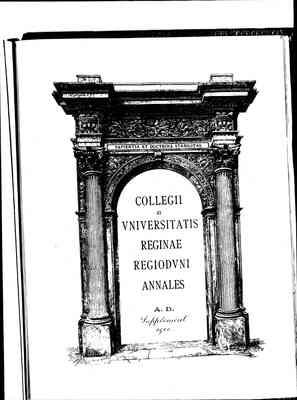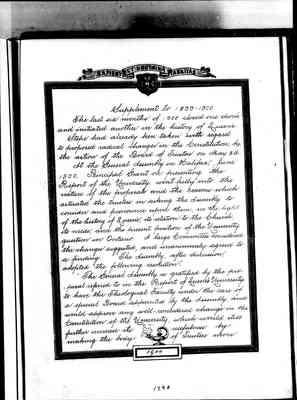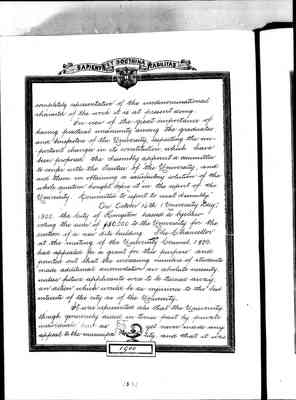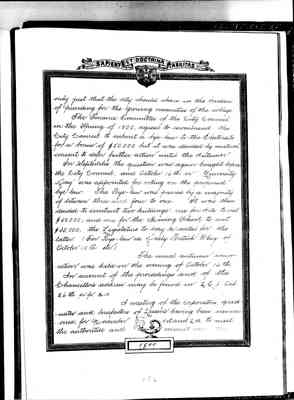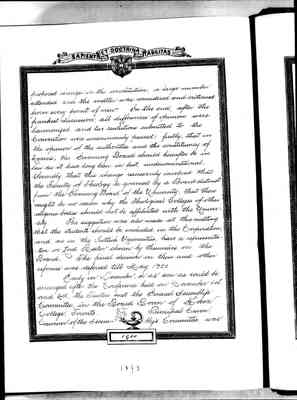Pages
page_0922
[image: Ribbon with motto, Sapientia, et Doctrina, Stabilitas , written above College Crest]
Supplement to 1899-1900
The last six months of 1900 closed one epoch and initiated another in the history of Queen's.
Steps had already been taken with regard to proposed radical changes in the Constitution, by the action of the Board of Trustees on May 2nd.
At the general Assembly in Halifax, June 1900, Principal Grant on presenting the Report of the University, went fully into the nature of the proposal and the reasons which actuated the trustees in asking the Assembly to consider and pronounce upon them, in the light of the history of Queen's, its relation to the Church, its needs and the present position of the University question in Ontario. A large Committee considered the changes suggested, and unanimously agreed to a finding. The Assembly, after discussion, adopted the following resolution:
The General Assembly is gratified by the proposal referred to in the Report of Queen's University, to have the Theological Faculty under the care of a special Board appointed by the Assembly, and would approve any well-considered change in the Constitution of the University, which would still further increase its usefulness by making the body of Trustees more
[image: morrocan lamp] 1899-1900
1380
page_0923
[image: Ribbon with motto, Sapientia, et Doctrina, Stabilitas , written above College Crest]
completely representative of the undenominational character of the work it is at present doing.
In view of the great importance of having practical unanimity among the graduates and benefactors of the University, respecting the important changes in its constitution, which have been proposed, the Assembly appoint a committee to confer with the Trustees of the University, and aid them in obtaining a satisfactory solution of the whole question brought before it in the report of the University. Committee to report to next Assembly.
On October 16th (University Day) 1900. the City of Kingston passed a bylaw voting the sum of $50,000 to the University for the erection of a new Arts building. The Chancellor at the meeting of the University Council, 1899, had appealed for a grant for this purpose and pointed out that the increasing numbers of students made additional accomodation an absolute necessity, unless future applicants were to be turned away, an action which would be as injurious to the best interests of the city as of the University.
It was represented also that the University, though generously aided in times past by private individuals had as yet never made any appeal to the municipality, and that it was
[image: morrocan lamp] 1900
1881
page_0924
[image: Ribbon with motto, Sapientia, et Doctrina, Stabilitas , written above College Crest]
only just that the city should share in the burden of providing for the growing necessities of the college.
The Finance Committee of the City Council, in the Spring of 1900, agreed to recommend the City Council to submit a bye-law to the Electorate for a bonus of $50,000 but it was decided by mutual consent to defer further action until the Autumn.
In September, the question was again brought before the City Council, and October 16th or 'University Day' was appointed for voting on the proposed bye-law. The Bye-law was passed by a majority of between three and four to one. It was then decided to construct two buildings: one for Arts to cost $50,000; and one for the Mining School to cost $35,000, the Legislature to pay a rental for the latter. (For Bye-law see Daily British Whig of October 10th etc.)
The usual autumn convocation was held on the evening of October 16th.
An account of the proceedings and of the Chancellor's address may be found in Q.C.J Oct. 26th p.p. 8 & 10.
A meeting of the corporators, graduates and benefactors of Queen's having been summoned, for November 1st and 2nd, to meet the authorities and consult on the
[image: morrocan lamp] 1900
1882
page_0925
[image: Ribbon with motto, Sapientia, et Doctrina, Stabilitas , written above College Crest]
proposed changes in the constitution, a large number attended and the matter was considered and criticised from every point of view. In the end, after the frankest discussions, all differences of opinion were harmonized, and two resolutions submitted to the convention were unanimously passed: firstly, that in the opinion of the authorities and the constituency of Queen's, the Governing Board should hereafter be in law as it had long been in fact, undenominational. Secondly, that this change necessarily involved that the Faculty of Theology be governed by a Board distinct from the Governing Board of the University, that there might be no reason why the Theological Colleges of other religious bodies should not be affiliated with the University. The suggestion was also made at this meeting that the students should be included in the Corporation, and, as in the Scottish Universities, have a representative or Lord Rector chosen by themselves, on the Board. The final decision on these and other reforms was deferred till May 1901.
Early in December, or as soon as could be arranged after the Conference held on November 1st and 2nd, the Trustee met the General Assembly's Committee, in the Board Room of Knox College, Toronto. Principal Caven, Convener of the Assembly's Committee, was
[image: morrocan lamp] 1900
1383
